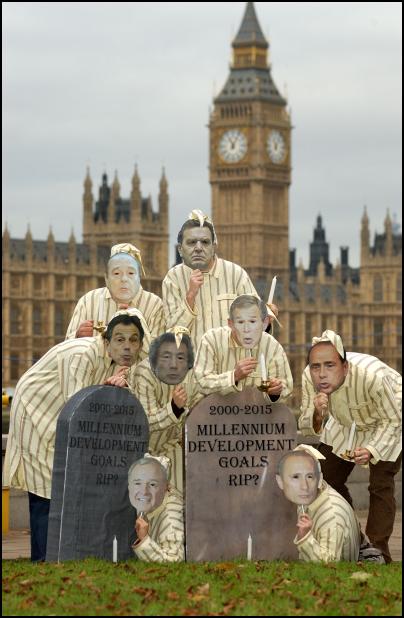Oxfam: Rich Countries’ Scrooge Act Costs The Poor
Media Release
For Immediate release: Monday December 6th
2004

Photo: Oxfam campaigners dressed as scrooges in front of Big Ben, wearing masks of Tony Blair, George Bush etc
A new report from international agency Oxfam today reveals that 45 million extra children will die needlessly by 2015, because rich countries are failing to provide the necessary resources they promised to overcome poverty.
The report, Paying the Price, finds that rich countries’ aid budgets are half what they were in 1960 and poor countries are paying back a staggering $100 million a day in debt repayments. Oxfam also calculates that 97 million more children will be out of school by 2015 unless urgent action is taken.
Barry Coates, Oxfam New Zealand Executive Director, said “We should not imagine that the problems only exist on the other side of the world. Right here in the Pacific, recent data suggest that basic targets for development will not be met in many countries without a lot more commitment from aid donors like New Zealand.”
Paying the Price comes on the eve of the launch of a global call to action against poverty involving organisations and high-profile figures around the world mobilising to demand an end to poverty. It warns that unless aid is increased by at least US$50 billion now and unless debts are cancelled, the internationally agreed Millennium Development Goals will not be met.
In 1970 the OECD group of rich countries agreed to spend just 0.7 percent of their incomes on aid. Thirty-four years later, few members have reached this target. New Zealand ranks 16th out of the 22 countries, with only 0.23 percent of national income going to overseas aid and no plans in place to up the percentage.
Coates: “New Zealand prides itself on being a good global citizen, but we are breaking our promises on international aid, with the consequence that we are failing our development partners in the Pacific and elsewhere. And there is real hardship in the Pacific. In some countries one child in four is malnourished and one child in three has no chance of going to school. In Papua New Guinea, maternal mortality figures remain shockingly high and there is a looming public health crisis as HIV infection rates reach a take-off point. Being a good global citizen means that the New Zealand government must take action on problems like these. Increased aid is required urgently.”
ENDS
For
more information or for a copy of the full report,
www.oxfam.org.nz
Notes to editors:
Paying the Price calls upon:
Donor countries to:
- Provide better quality and more overseas aid funding, including at least US$50 billion in extra aid immediately
- Set timetables in 2005 to ensure that the target of 0.7 percent of national income to be spent on aid is met by 2010
- Cancel 100 percent of the debt of the poorest countries, including bilateral debts and debts owed to the World Bank and African Development Bank.
- Fully implement commitments to improve delivery of aid and untie aid – (as they have promised in the Rome Declaration 2003)
The World Bank
and IMF to:
- Cancel 100 per cent of the debts owed to them by the poorest countries where it is needed for them to be able to reach the MDGs; revaluing IMF gold reserves and using the resources generated to do so.
- Restrict the use of conditions on loans and grants to poor countries to requirements for financial accountability measures and broadly agreed goals on poverty reduction and gender equity.
Developing-country governments to:
- Spend 20 percent of public budgets on basic social services in order to reduce poverty
- Institutionalise civil society and parliamentary participation in creation of pro-poor policies, also guaranteeing rights to free and fair elections, freedom of expression and the rule of law.
Facts about the MDGs
- The Millennium Development Goals (MDGs) are eight targets set for global action on poverty by 2015 – they were set by leaders of 189 countries in 2000 and include achieving universal primary education, halving the number of people living in poverty and hunger, improving health and halting the spread of diseases such as HIV/AIDs.
- Rich countries today give half as much as a proportion of their income as they did in the 1960s. In 1960-65, rich countries spent on average 0.48 per cent of their combined national incomes on aid. By 1980-85 they were spending just 0.34 per cent. By 2003, the average had dropped as low as 0.24 per cent.
- Rich countries’
aid budgets are half what they were in 1960 – rich countries
now give 0.24% of their income to foreign aid, compared to
0.48% in 1960.
In New Zealand
Oxfam New Zealand is a member of a Non-Governmental Organisation coalition called the Point Seven Campaign, which is calling for the government to invest more aid in a better world, and Jubilee Aotearoa, calling for cancellation of the unpayable debts of the poorest countries.


 Gordon Campbell: On Surviving Trump’s Trip To La La Land
Gordon Campbell: On Surviving Trump’s Trip To La La Land Greenpeace: Greenpeace Slams PM’s Science Pick - 'Polluters Are Running The Show'
Greenpeace: Greenpeace Slams PM’s Science Pick - 'Polluters Are Running The Show' NZ Government: PM’s Science Prizes Celebrate Excellence
NZ Government: PM’s Science Prizes Celebrate Excellence Department of Conservation: Pinnacles Hut, Summit Track Set For Improvement
Department of Conservation: Pinnacles Hut, Summit Track Set For Improvement  Tax Justice Aotearoa: New Report Illustrates Tax System Failures
Tax Justice Aotearoa: New Report Illustrates Tax System Failures PSA: PSA Welcomes Increased Defence Spend On Civilian Salaries
PSA: PSA Welcomes Increased Defence Spend On Civilian Salaries New Zealand Government: New Helicopters A Commitment To Global Security
New Zealand Government: New Helicopters A Commitment To Global Security


